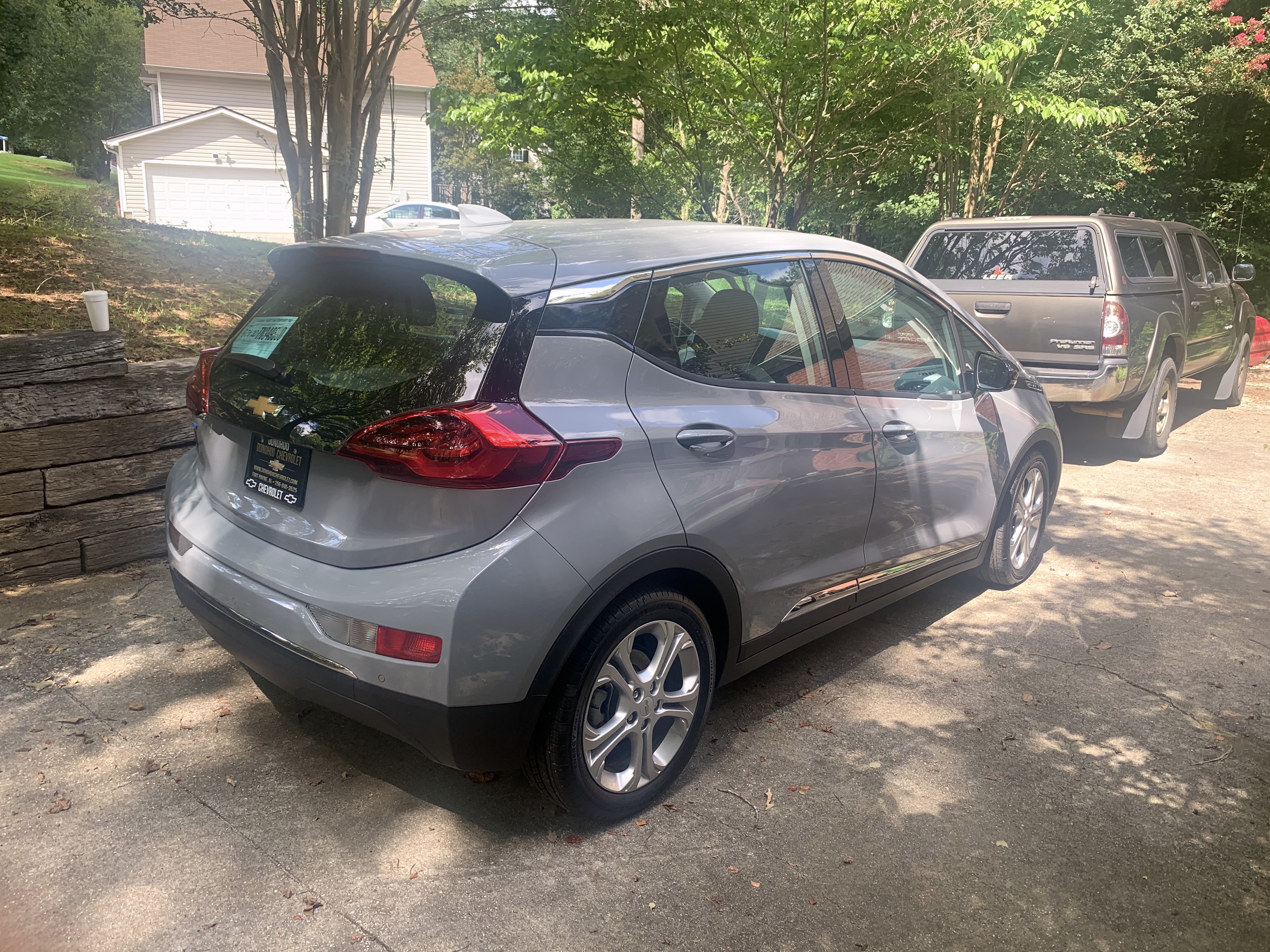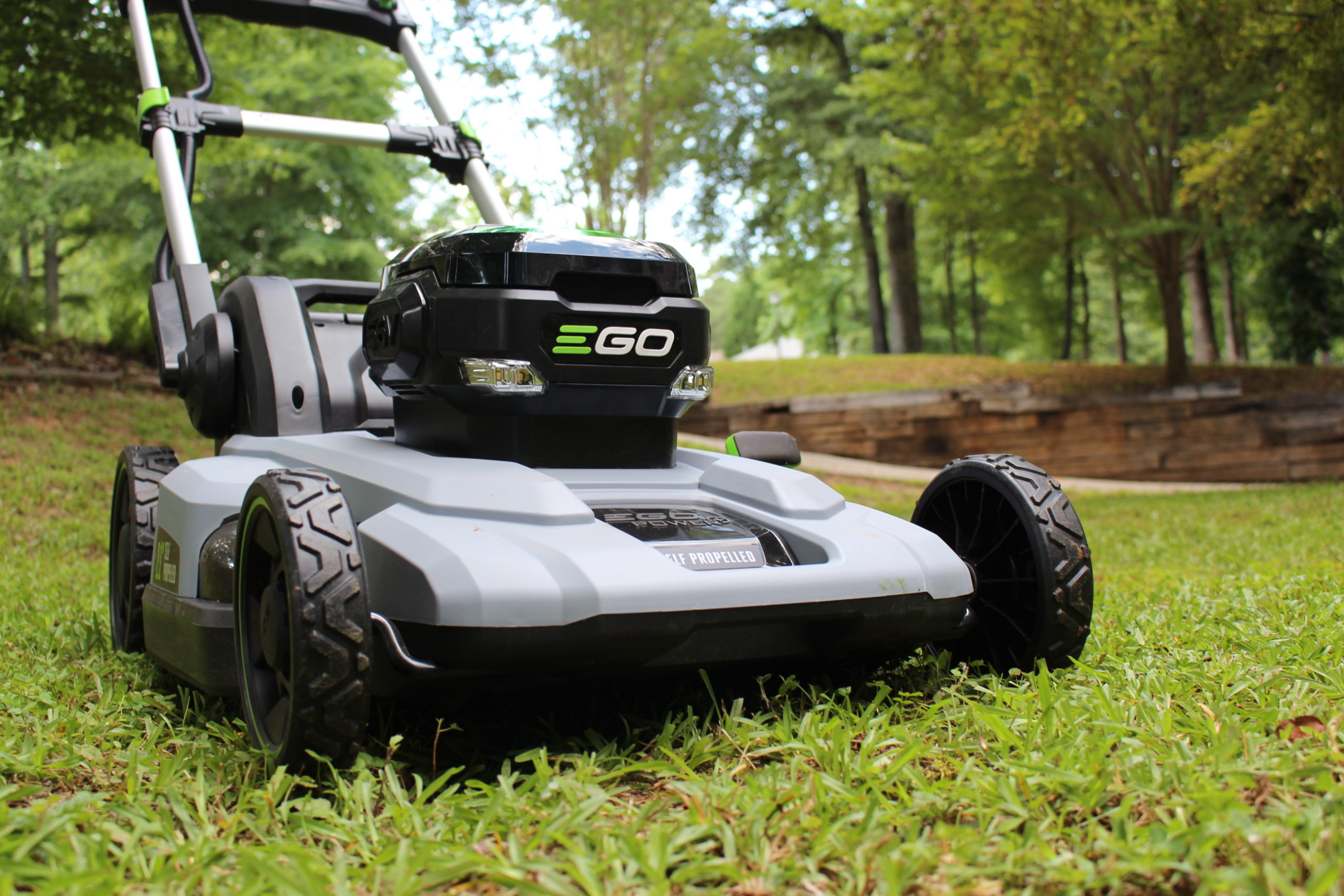In this post I’m going to share my first year electric car experience. I’ll also discuss some of my reasons for buying an electric car and the pros and cons. One year has taught me several lessons.
Chevy Bolt Overview
I bought the 2020 Chevy Bolt just over one year ago as of this writing. The Bolt (not to be confused with the Chevy Volt) is a total electric car. So far, I’ve put 8000 miles on the car and haven’t had any issues. I use it mainly for work commutes and around town. It has an advertised range of 259 miles. Depending on the weather conditions and how I drive the car, I might get more or fewer than 259 miles. I would describe the Bolt as a hatchback, but it’s very roomy inside. I mostly charge it at home with the 120 volt charging cord which came with the car. I own the base model, but they also offer the Premier version which might have a few more bells and whistles. They recently came out with the Chevy Bolt SUV, but I’m not familiar with this model.
Why Did I Buy an Electric Car?
First, I’d like to say I’m not an environmental doomsayer, but I like the idea of breathing cleaner air and not being so reliant on oil. For me, the Bolt’s price tag was reasonable, and I’m saving thousands of dollars a year by not buying gasoline. Using electricity is cheaper (at least it is here in the Southeast) and the electric rates are more stable.
Then there’s the cool factor! As an engineer and gearhead, I love driving this car. That was probably one of the biggest factors that sold me was the smooth acceleration and peppiness of the car. I can definitely tell a difference when I drive my internal combustion engine (ICE) vehicles versus the Bolt. If you want to experience an electric car, just go test drive one. Tip – I do all my test driving at CarMax. No pressure at CarMax to make a sale.
I was also comfortable buying the Bolt because I have the safety net of two ICE vehicles – my truck for hauling stuff and our sedan to take long trips. I chose not to convert all my vehicles to electric, but there’s nothing wrong with having one electric car in the pool. I’ve learned a lot from having one and haven’t regretted getting it.
I originally bought the Bolt thinking it would be my 65-mile-round-trip commute car. And where I work (the 32.5 mile mark) they offer free charging. Then COVID hit and we started working from home. But it’s still a fun car to drive around town and do short trips.
The Buying Experience
Let me say just a brief word on the buying experience. I learned very fast that most car salespeople don’t know much about electric cars. I guess I can’t blame them since they probably don’t sell as many electric cars as the ICE cars. But still – I was surprised.
Personally, I like to shop for cars on the internet before ever stepping foot on a car dealership. I go ahead and work out the price and the details over the phone. Then I go in and sign the papers and pick up the car. Doing this for an electric car was a little difficult since I couldn’t get most of the salesmen to answer questions correctly. Does the car have a fast charging port? Can you send me a picture of the charging port? Most of them didn’t know what I was talking about.
Bottomline – do your homework first. Chances are you will know much more than the salespeople. This gives you leverage. Unfortunately, you may have to go to the dealership to verify the car has the features you need. But for me, I mainly had to verify the car had fast charging capabilities. That’s extremely important if you want to take an electric car on a longer road trip.
The Pros and the Cons
First, I will share some bullet points and then elaborate on them later. Some of these I’ve already discussed.
Pros
- Reasonable Price
- Fuel (electricity) is generally cheaper (especially in the Southeast)
- Cheaper and easier to maintain
- Smooth acceleration
- Quick acceleration (0-60 mph in 6 sec)
- Regenerative braking (charges car and brakes last longer)
- Can charge at home
- Conveniences and incentives
Cons
- Range anxiety
- Dealership needs to fix problems
- Technology obsolescence
- Public Misconceptions/Concerns
Price & Federal Subsidies
If you compare apples-to-apples, the electric car may price out higher than its comparable ICE car. However, if you factor in less maintenance costs and fuel costs, (and maybe subsidies) the electric car could come out about the same. I also know people who spend half the price of a mortgage on an SUV, a sports car, or a luxury vehicle. I could buy two Chevy Bolts for those prices. So, it’s all relative.
Much of the cost for an electric car you will find in the batteries. Good news is that the cost of batteries continues to drop. The bad news is technology in these vehicles changes swiftly. Your brand new electric car’s battery technology might be out of date in 3 or 4 years. Which is why many decide to buy these vehicles on 3-year leases. Personally, I still like to buy a car and drive it for ten years. I just hope that the batteries and electronic components will hold up that long. Right now, I feel pretty confident about the longevity of the batteries.
Fortunately, and with the swift changes in technology, the used electric car market is strong. And you can find some great deals on used electric cars right now.
Federal subsidies can also be a good thing. Unfortunately for me, the subsidies ran out on the Chevy Bolt since Chevy sold its limit. Although I can’t prove it, I’ve often wondered if the subsidies may have inflated the price. Think about it – if the dealer knows you will get a subsidy, they may be tempted to ask more on the price. And the salespeople I talked to never failed to mention this in their sales pitch. Many didn’t even realize that the subsidy on the Bolt had run out. I had to remind them.
Just be careful here. The car dealership is NOT the one who gives you the subsidy. The government does that through your taxes and you may not qualify for the whole subsidy. My H&R Block guy gave me some good advice on this, so you may want to consult with your tax advisor.
Less Maintenance
I’ve only had the car for one year, so I guess the claim of less maintenance remains to be seen.
But it does make sense when you think about:
- No oil to change
- No air filter to change (just the cabin air filter)
- No traditional transmission and therefore no transmission fluid
- No sparkplugs
- No carburetor
- Less moving components to break
- No belts or timing chains to fail
- Less wear on the brakes (especially with regenerative braking)
- No emissions test
Yes, I will need to maintain the tires like any other car. Believe it or not, the Bolt also has a traditional 12 volt battery. So, I suspect it will probably need to be changed out in 4 to 5 years. Then there are all the electronic components. Electric cars do have air conditioning systems.
Many like the idea of getting a hybrid, especially if they’re worried about driving range. But the hybrids can potentially have more problems. Not only do you have the electrical-drive system, but you have all the other parts and systems from having the gasoline engine. That’s more things that can go wrong.
Range Anxiety
Yes, many seem concerned with how far they can go to get to the next charging station. And let’s face it – charging stations aren’t on every corner like the gas stations. That scenario is getting better though.
To me range isn’t a big deal. My main reasons for buying an electric car are commuting to work, getting around town, and occasionally taking short trips to see friends or relatives.
I do 99.9% of my charging at home, plugged into a 120 volt outlet. I will eventually put in a 240 volt charger, but really, I haven’t had the need to do so. Although, I have read that the 240 volt charger may be better for the battery long term. Some dealers / manufacturers offer paying for the 240 volt charger installation, so consider this in your negotiating.
But what about taking the electric car on longer road trips?
Charging stations are sparser than gas stations, but with an app like PlugShare you can easily plan out a long road trip. This is something you can check out now before ever buying an electric car. Download the PlugShare app and you can quickly research what fast-charging stations are along common routes you travel now. The number of stations continues to grow.
When looking at PlugShare, make sure you filter on Fast Chargers. I like to try to stop every 80 to 100 miles and use a fast charger to get me back up to 80% charge. That can take anywhere from 20 to 30 minutes depending on the charger. Many of these chargers are located close to shopping centers or restaurants. So, I’ll shop or eat lunch/dinner while the car charges back up.
Many hotels have the Level 2 (240 volt) chargers. So, if I’m staying overnight, I’ll hook the car up to the hotel’s Level 2 charger. No question about it – it’s an exercise in multitasking.
Can My Traditional Mechanic Fix my Electric Car?
This was one of the biggest tradeoffs I felt with buying the Chevy Bolt. If something breaks, chances are my personal mechanic can’t fix it. I’ll have to take it in to the dealer. So, I’m banking on the probability of fewer maintenance problems. Fewer reasons to take it to the dealer. We shall see.
This scenario will probably change as more and more technicians get trained to work on these cars. Independent mechanics will eventually be forced to have technicians that can service electric cars.
The batteries for the Bolt are warrantied for eight years. Most other electric cars have a similar warranty.
The electric car can be an even bigger challenge for the do-it-yourselfer, but so can the modern-day ICE vehicle. In general, all cars have gotten much more advanced since our parent’s and grandparent’s generation.
Conveniences and Incentives
One thing I like about having an electric car, is I can often find a vacant parking space(for charging) in a full parking lot. That may change as more and more people buy electric cars. Just make sure you follow charging etiquette and move your car once it’s charged up.
I’m also getting a monthly credit back from my utility company for at least a whole year. This is money I can apply toward buying a 240 volt (also referred to as a level 2 charger) charger for my garage. To qualify, all I had to do was send them a copy of the bill-of-sale.
Some modern-day homes are wired to accept the charge from your vehicle to power things in your home. They call them Smart Homes, but I will say that is pretty cutting edge technology and there are kinks that may still need to be worked out.
Charging
There are basically three ways to charge:
- Level 1 Chargers (120 volt charger that comes with your car at purchase). This charger can plug into a regular 120 volt outlet in your garage. The tradeoff is that it can take many more hours to charge the battery.
- Level 2 Chargers (240 volt charger that you purchase separately). For this charger, you may have to hire an electrician to install it. You need a dedicated 240 volt receptacle. The advantage with a Level 2 charger is you can charge your vehicle much faster.
- Fast Chargers. Most people don’t personally own a fast charger, but I would recommend that you buy an electric car that has fast-charging capabilities. Normally the only time you would use a fast charger is when taking an extra-long road trip. You can find these with an app like PlugShare. And you can pay with your credit card.
Answering Other Concerns
If you search the internet, you’re bound to find articles about electric cars going awry. And you’ll hear rumors that get exaggerated. While I’m pretty bummed out that all Chevy Bolts have recently been recalled for potential battery fires, it’s true that many other cars experience fires. Some of Toyota’s Rav4 models are being investigated now for potential fires.
Recalls occur for all kinds of vehicles. Just think about the Takata air bag recalls that affected millions of gasoline cars and trucks. People were killed because of that defect. And you may remember the Toyota accelerator problem that happened just a few years ago? My truck was in that recall.
My Biggest Takeaway
My biggest takeaway from owning an electric car is the newness of the technology – especially the battery technology. Everyone is trying to create the latest battery that will get even more range. I pray they are also making them more safe and reliable.
I spent a lot of time studying the Chevy Bolt, and it seemed to have a great track record. What I didn’t know was the track record of the battery manufacturer LG Chem. In the future, I might be a little more hesitant to buy an electric car that has batteries produced by LG Chem.
I’m still hoping that GM and LG Chem will make things right and fix the Bolt battery defect in this recent recall. At least GM has promised that with a new battery, they will also give Bolt owners a new 8 year / 100,000 mile warranty on the battery pack. And earlier year models will get the newest battery technology with a boost in range.
My guess is that electric car technology and reliability will only continue to get better. These cars may not be for everyone, but they’re quickly moving into the mainstream. Tesla is probably the biggest driver for this. And now traditional car manufacturers realize they will need to compete with Tesla to hold on to their market share.
Although I’m disappointed with the recall, I love the Chevy Bolt. It’s by far the funnest car I’ve ever owned. While I’m not sold on the idea of all my vehicles being electric, I believe I made a good decision on buying an electric car. I tried something new and, I’m continuing to learn more from the experience. And–I’m also saving money on gas!
Anyway, I hope you’ve enjoyed my thoughts on my first year electric car experience. Feel free to ask questions or share your experiences. You can also email me through the contact page, if you have a lot of questions.




Are you starting up a new shop? Want to work safer in your shop? To help you answer these questions I've put together a 2-part checklist -- Home Shop Safety & Tool Checklist.
I will also send you updates of my latest woodworking and DIY projects. You can get all this by subscribing to my free email newsletter.






Greetings from Boise, Idaho!
I’ve had a Nissan Leaf for about 6 months, and I absolutely LOVE this car! I agree with many of the points in your article. No problems yet, and I am going to check out possible rebates from the electric company.
The Nissan Leaf is a great car and one of the leading EVs out there. I found the rebate info on my electric company’s website. They just asked for a copy of the bill of sale and started deducting a certain amount from the bill each month. Good luck and thanks for the comment!